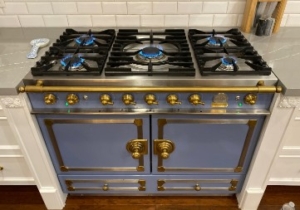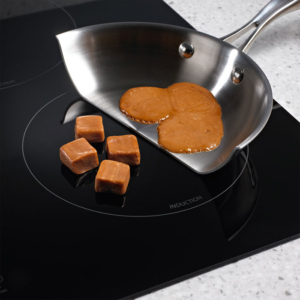The Pros and Cons of Gas vs. Electric Ranges:
Which is Better for Your Kitchen?
Deciding on the best range for your kitchen can be a tough choice. With so many options out there, it’s hard to know where to start. Gas vs. Electric ranges are often the first decision. Each type has its own set of pros and cons. Which one will be a perfect fit for your kitchen? Let’s dive in and explore both options to help you make an informed decision.
Gas Ranges
Gas ranges have long been a popular choice for kitchens, offering a reliable and efficient cooking experience. In this section, we will discuss the pros and cons of gas ranges, helping you determine if this type of range is the right fit for your kitchen.
Pros of Gas Ranges
Gas ranges offer several advantages that make them a preferred choice for many home cooks. Here are some of the pros of using a gas range in your kitchen:
- Precise Temperature Control: Gas ranges provide instant heat and precise temperature control. Unlike electric ranges that take time to heat up and cool down, gas ranges allow you to adjust the flame instantly, giving you more control over your cooking process. This precision is particularly important for delicate dishes that require quick adjustments in heat levels.
- Even Heat Distribution: Gas burners distribute heat evenly across the cooking surface. This ensures that your food is cooked consistently, reducing the chances of unevenly cooked meals. Whether you’re simmering a sauce or searing a steak, gas ranges provide a reliable and consistent heat source.
- Versatility: Gas ranges offer a wide range of cooking options. With multiple burners of varying sizes and heat intensities, you can easily switch between high and low heat settings to accommodate different cooking techniques. From boiling and frying to sautéing and simmering, a gas range provides the flexibility to handle various recipes and cooking styles.
- Energy Efficiency: Gas ranges are generally more energy-efficient than electric ranges. The direct flame of a gas burner heats up the cookware directly, resulting in less heat loss compared to electric coils or smooth-top surfaces. This efficiency can lead to lower energy bills and a reduced environmental impact.
Cons of Gas Ranges
While gas ranges have numerous benefits, they also have a few drawbacks to consider. Here are some cons of using a gas range in your kitchen:
- Higher Installation Costs: Gas ranges require a gas supply line to be installed in your kitchen. If your kitchen doesn’t already have a gas line, the installation process can be costly and time-consuming. Additionally, you may need to hire a professional to ensure the proper connection and safety measures are in place.
- Potential Safety Risks: Gas ranges carry a slight risk of gas leaks or carbon monoxide poisoning if not properly maintained or used correctly. It’s important to have your gas range regularly serviced and ensure that the ventilation in your kitchen is adequate. Installing a carbon monoxide detector nearby is also recommended for added safety.
- Limited Availability: Depending on your location, gas lines may not be readily available or accessible. If you live in an area where natural gas is not readily accessible, using a gas range may not be feasible or may require alternative fuel sources such as propane. This limitation can add extra costs and logistical challenges.
- Cleaning and Maintenance: Gas ranges can be slightly more challenging to clean and maintain compared to electric ranges. The burner grates and drip pans require regular cleaning to prevent buildup and ensure optimal performance. Additionally, gas burners may require periodic adjustment and cleaning to maintain their efficiency.
Electric Ranges
Electric ranges have become increasingly popular in modern kitchens due to their convenience and efficiency. In this section, we will explore the pros and cons of electric ranges to help you determine if they are the right choice for your kitchen.
Pros of Electric Ranges
- Precision Cooking: Electric ranges offer precise temperature control, allowing you to cook your food with accuracy. This is especially beneficial for delicate dishes that require specific heat levels.
- Even Heat Distribution: Electric ranges distribute heat evenly across the cooking surface, ensuring that your food cooks uniformly. This eliminates the risk of hot spots that can lead to unevenly cooked meals.
- Safety: Electric ranges are generally considered safer than gas ranges. They do not produce an open flame, reducing the risk of gas leaks and potential fire hazards. In addition, many electric ranges have built-in safety features such as automatic shut-off and child lock controls.
- Easy to Clean: Electric ranges are typically easier to clean compared to gas ranges. The smooth, flat surface of electric cooktops eliminates the need to remove and clean burner grates. Spills and splatters can be quickly wiped away with ease.
- Energy Efficiency: Electric ranges are known for their energy efficiency. They convert a higher percentage of electricity into heat, resulting in less wasted energy compared to gas ranges. This can lead to lower energy bills in the long run.
Cons of Electric Ranges
- Slower Heat Response: Electric ranges take longer to heat up and cool down compared to gas ranges. This can be a drawback if you are accustomed to the instant heat control provided by gas burners.
- Higher Operating Costs: While electric ranges are more energy-efficient, electricity rates can be higher than natural gas rates in some areas. This means that operating an electric range may result in slightly higher energy bills.
- Limited Cookware Compatibility: Electric ranges require flat-bottomed cookware for optimal heat transfer. Cookware with warped or uneven bottoms may not make proper contact with the electric coils, leading to inconsistent cooking results.
- Power Outage Dependency: Electric ranges rely entirely on electricity to function. In the event of a power outage, you will not be able to use your electric range. This can be a significant inconvenience, especially if you rely heavily on your range for cooking.
- Initial Installation Cost: Electric ranges may have a higher initial installation cost compared to gas ranges. This is partly due to the need for a dedicated electrical circuit to supply power to the range. However, the long-term energy savings may offset this initial expense.
Factors to Consider
When it comes to choosing between a gas range and an electric range for your kitchen, there are several factors you need to consider. Each type has its own advantages and drawbacks, so it’s important to weigh these factors before making a decision. In this section, we will explore the key aspects that you should take into account: cost, cooking performance, safety, energy efficiency, and maintenance.
Cost
When it comes to cost, gas ranges and electric ranges differ in terms of both upfront expenses and long-term operating costs. Gas ranges tend to be more expensive to purchase initially, as they require a gas line installation if you don’t already have one. On the other hand, electric ranges are generally more affordable upfront.
However, in terms of operating costs, gas ranges have the upper hand. Natural gas is typically cheaper than electricity, so cooking with gas can result in lower monthly utility bills. Additionally, gas ranges often have lower maintenance costs in the long run, as they have fewer complex components compared to electric ranges.
Cooking Performance
The cooking performance of a range is a crucial consideration for any aspiring chef or home cook. Gas ranges provide instant heat and precise temperature control, making them popular among those who enjoy cooking delicate dishes or recipes that require quick adjustments. The open flame of a gas range also allows for more even heat distribution, resulting in more consistently cooked meals.
On the other hand, electric ranges can take longer to heat up and cool down, which may lead to slight temperature fluctuations. However, electric ranges often come with features like smooth-top surfaces or induction cooking, which provide a more even heat distribution and are easier to clean.
Safety
Safety is paramount in any kitchen, and both gas and electric ranges have their own safety considerations. Gas ranges have an open flame, which poses a potential fire hazard if not used with care. Additionally, gas leaks can be dangerous if not detected promptly. However, modern gas ranges are equipped with safety features like automatic shut-off valves and flame sensors to mitigate these risks.
Electric ranges, on the other hand, eliminate the risk of open flames but come with their own set of safety concerns. The smooth-top surfaces of electric ranges can remain hot after cooking, posing a burn risk. However, many electric ranges now have indicator lights to warn users when the surface is still hot.
Energy Efficiency
Energy efficiency is an important consideration, both for the environment and your wallet. Gas ranges are generally more energy-efficient than electric ranges since natural gas is a more efficient fuel source than electricity. Gas burners provide immediate heat without any preheating time, while electric ranges may take a while to reach the desired temperature.
However, electric ranges have improved over the years and now offer more energy-efficient options. Induction cooking, in particular, is highly energy-efficient as it directly heats the cookware and not the surrounding air.
Maintenance
Maintenance is another factor to consider when choosing between gas and electric ranges. Gas ranges generally have fewer complex components, making them easier to maintain. Cleaning a gas range usually involves removing and cleaning the individual burners and grates. Electric ranges, on the other hand, may require more effort to clean due to the smooth-top surfaces or coils.
It’s important to consider your own preferences and lifestyle when weighing the maintenance requirements of each type of range.
Overall, choosing between a gas range and an electric range depends on your specific needs, budget, and cooking style. By carefully considering factors such as cost, cooking performance, safety, energy efficiency, and maintenance, you can make an informed decision that will best suit your kitchen and culinary aspirations.
Conclusion
The choice between gas and electric ranges ultimately depends on your specific needs and preferences. Both options have their pros and cons, and it’s important to consider these factors before making a decision.
Gas ranges offer precise temperature control, faster heating times, and are generally preferred by professional chefs. They also allow for more traditional cooking techniques like open flame cooking and charring. However, they require a gas hookup, which may not be available in all homes, and can be more expensive to install.
On the other hand, electric ranges are generally more affordable upfront, easy to clean, and provide consistent heat distribution. They also don’t require a gas hookup, making them suitable for homes without gas lines. However, they may have slower heating times and less precise temperature control compared to gas ranges.
Ultimately, your decision should be based on your cooking preferences, available resources, and budget. Consider factors such as the type of cooking you do, the availability of gas hookup, and your energy costs. By carefully evaluating these factors, you can choose the range that best suits your kitchen and cooking needs.









